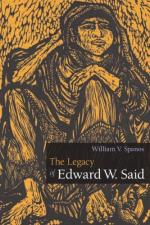|
This section contains 4,966 words (approx. 17 pages at 300 words per page) |

|
SOURCE: "Arafat's Man in New York," in New York, Vol. 22, No. 4, January 23, 1989, pp. 40-6.
In the essay below, Smith provides an overview of Said's life and career.
On the afternoon of December 14, a Columbia University professor returning home from London, where he'd delivered a lecture on Yeats, pushed open the door of his Morningside Heights apartment and found his wife and two children gathered around the television set. History was being made.
It was history that Edward Said, a Palestinian-born professor of English and comparative literature, had helped create. Said joined his family around the TV and listened as Secretary of State George P. Shultz announced that the United States—after years of refusing to recognize the Palestine Liberation Organization—would begin talks with the group's representatives in Tunis. Said sank into a chair. "The taboo has been lifted," he said.
For years, the Palestinians, Israel, and the...
|
This section contains 4,966 words (approx. 17 pages at 300 words per page) |

|


